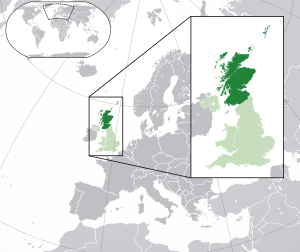Scotland
Þes tramet is of þæt land þæt is Brytene norðdǣl. For þǣm ƿesternum īegland þæt geo hēt man Scotland oððe Igbernia, sīeh Īrland
| |||||
| Royal cƿide: Nemo me impune lacessit (Læden: Nǣnig ābylgeþ mē ƿītelēase) | |||||

| |||||
| Ambihtlicu sprǣc | Englisc, Scyttisc | ||||
| Hēafod | Edinburg | ||||
| Mæst burg | Glasgoƿ | ||||
| Ǣrest Ambihtmann | John Swinney | ||||
| Mearc - Getæl - % wæter |
Ranked 2nd UK 78,782 km² 1.9% | ||||
| Lēodrǣden - Getæl (2001) - Þiccnes |
Ranked 2nd UK 5,062,011 64/km² | ||||
| Establishment | Cenneð MacAlpin, 843 | ||||
| Feoh | Pund sterling (£) (GBP) | ||||
| Tīdgyrtel | UTC, Summor: UTC +1 | ||||
| Þēodlic antefn | Blōstm Scotlandes (de facto)1 | ||||
| Þēodlic blōstm | Þistel | ||||
| Hlēowsanct | St. Andrew | ||||
| Internet TLD | .uk2 | ||||
| Calling Code | 442 | ||||
|
(1) To date, Scotland does not officially recognise one single national anthem. Over the years, the role of the nation's anthem has been filled by various patriotic songs, including Flower of Scotland, Scotland the Brave and Scots Wha Hae. In the 1990s, one of the country's leading tabloid newspapers conducted a poll to determine which song should be classed as Scotland's anthem. Flower of Scotland won and is now used as the de facto national anthem at international sporting events, although there are those who still consider the other songs as having equal validity. | |||||
Scotland is land þæs Geānlǣhtan Cynerīces and is se norðenmest dǣl Brytene īege.
Scotland (Scyttisc: Alba) is landrīce oþþe þēod and ǣrselfdēmende cynerīce norþƿestre Europe, and gǣþ tō ānum dǣle fēoƿera þæs Geānlǣhtan Cynerīces. Scotland hæfþ landmearc mid Englalande and is elles gebunden be sǣ and gārsecge. Hit hæfþ mænigefeald īege in þāra brime his ƿesthealfe and be norþen (Orcanege and Hjaltland).
Scottarīċe
[adihtan | adihtan fruman]Scotland ƿæs in gēardagum cynerīce. Mid Englarīce ƿæs hit geānlǣhte be Anne Cƿēne in 1707, Grēate Bryten Cynerīce to scieppenne.

